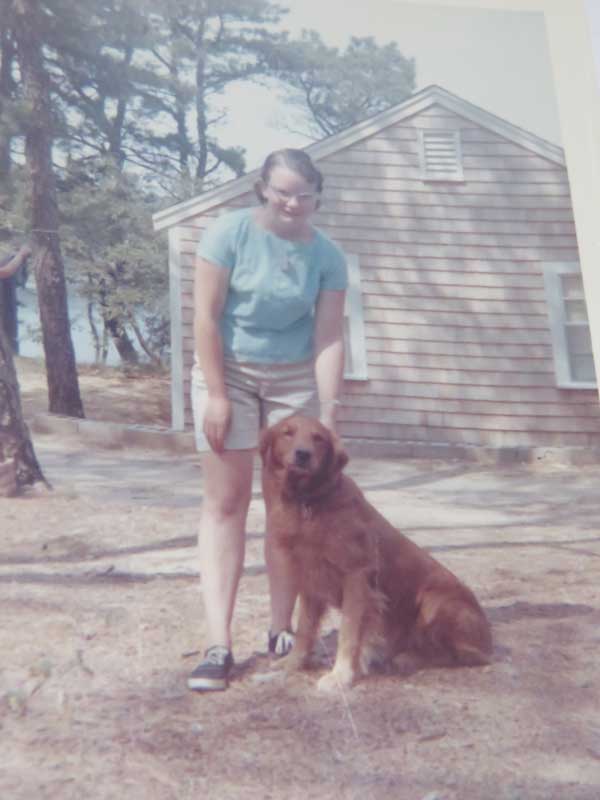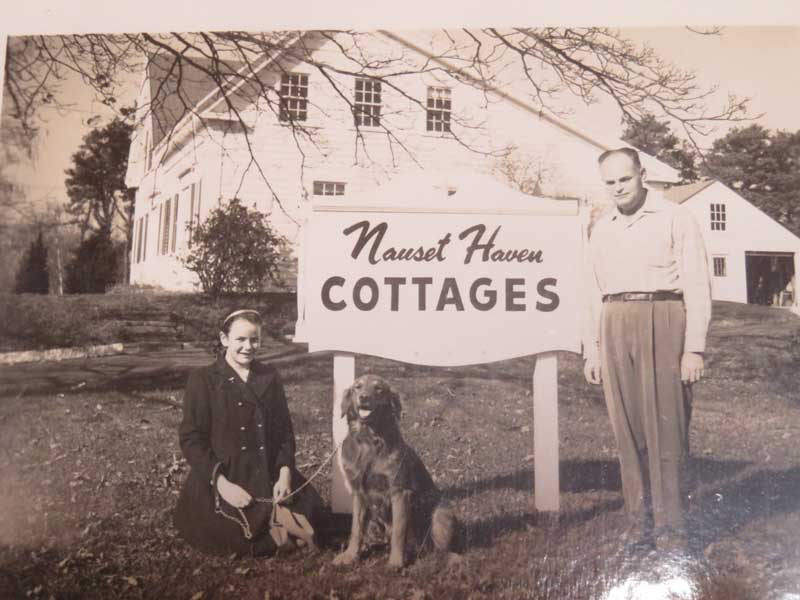
I can’t write about Eastham and life at Nauset Haven without including Buster. Though he was also our family dog, whenever I was home, especially when I walked around the pond, he was mine. My friend, my confidant, my always ready companion and listener. (With just a couple of minor exceptions: Buster never took to rides in a rowboat, so whenever I moored somewhere around the shore, he’d run to meet me and explore where I’d ended up. Also he took a dim view of ice, and after some spectacular, falling-in-a-heap slides across the surface (can a Golden Retriever be embarrassed?), Buster stuck to the shore.)
He’d entered our family history before we came to Eastham. I was in fourth grade at the time, and we’d been looking for a dog. A vet we knew notified my parents of two animals for adoption. Would we like to come by and check them out? Sure!
Just as we went down the steps to the car, my grandmother called out, “Now, don’t bring home a big dog!”
Arriving at the vet’s office, we met up with a shambling basset hound—and Buster. The basset was well-meaning, and well, dull. It shuffled about and didn’t do much. Not so, Buster! He sashayed in, tail swishing magazines off the table, greeting us all and kidnapping my glove. He kept leaning against me, licking and affectionate. Who wouldn’t respond? We left the basset there.
When we brought Buster home, Grammie looked quite taken aback, but he set to work on her right away and soon she was saying things like, “Oh, Rusty’s so sweet!” Rusty being the name I’d chosen; my father voted for Rufus, as Buster’s coat was pretty ruddy for a retriever, enough so that we wondered if he had some Irish setter blood in him. The moniker Rusty stuck for a while, but once at Nauset Haven, he became Buster.
Of course Buster came along the momentous time I ever saw Nauset Haven, a breezy spring day in 1957. Once I’d been polite and shaken hands with people, my parents settled in to sign papers, so Buster and I escaped and went out to explore. He must have been as happy as I was. Three acres of land, trees—and the Pond! And nine cute little cottages among pine trees, oh, and a swing set, and paths to walk in the woods. I could hardly believe I was going to live here. Buster of course investigated all the new sniffs. Though I couldn’t have voiced it this way that day, the place seemed like Nauset Heaven.
Once we’d moved and begun our first summer of operating the cottage business, Buster charmed our renters and friends as easily as he’d taken over my grandmother, though this came to have its drawbacks. He was getting plump, which seemed odd considering all the running around he did. A chance happening one Saturday evening put us wise. Buster was going door to door, cottage by cottage, from about 5 P.M. on. No one could resist his big brown eyes, so lots of suppers came his way on top of our feeding. Kids threw him bits of hamburgers and hot dogs, and of course chips and things fell off picnic tables. After that, we kept Buster in until 7:30 or 8 P.M.
Like all Cape animals, though, Buster attracted wood ticks. The horrid little black things leaped into his fur as he wandered or waded about in the reeds around the pond, and then attached themselves and swelled up with blood. The only remedy seemed to be a nightly session after supper: wedging Buster between his knees and wielding a pair of tweezers, my father would pull out the ticks. While the local vet did preventive tick “baths,” their effect lasted perhaps two days, maybe three. We finally gave up entirely, though; after one of these baths, we let Buster out of the car and he immediately took off, lay down in a large mud puddle, and rolled and rolled. Daddy was disgusted.
Water.! Of course, being a retriever, Buster loved it, especially the pond where he swam after sticks or a thrown tennis ball. He was even happier just padding around and snouting in the reeds at the edge. He’d dip his snout in and pick up stones, then deposit them on shore.
His greatest pleasure, though, was eggs.
For a while, we owned a flock of perhaps a dozen white Pekin ducks, whom we fed corn meal. It was great fun to arrive on the beach, ratting the dried meal in a tin can, and watch the ducks madly rush across from the other side, wings flapping! IIn late spring or early summer , they laid eggs—in the reeds, though, not being natural nurturers. Buster would sniff out these big white delicacies, gingerly lift them in his teeth, and carry them to dry land where he lay down and rolled luxuriantly over the eggs, absorbing oils and yolks and shell bits and all into his fur. Later, of course, he got to smelling “pretty ripe” as my father put it. Into the bathtub or under the hose!
We also had to resort to the hose the only time I ever remember Buster getting into a fight. Normally we didn’t encourage our guests to bring pets but did make exceptions. Alas, one family brought their Golden and the two dogs immediately went at it over territory. After that, they and we adjusted schedules and kept the two dogs separate for the rest of their stay. (An especially large Golden, their dog had the charming property of swimming out after his owner, then placing his front paws on Mr. C’s shoulders. Mr. C. would quickly turn the animal around and send it back to shore, not at all eager to continue supporting a heavy thrashing furry body.)
In the off-season, my parents and I would walk the beaches, especially the great Outer Atlantic Beach and Buster (in those pre-leash days) would just Take Off! Something about the place acted upon him, made him dash vast distances endlessly, though he’d periodically return to check up on us, collapse and pant briefly, and then, off again! The only drawback to all this was that on the way home he became ultra-affectionate and wanted to sit in my lap, wet and sandy and panting and heavy. Oh, and once again, pretty smelly. The only real trouble Buster gave us was wandering. Though long since neutered, he still responded to the signals of some female miles across town (as did a bunch of other dogs) and we’d get calls to come and get him. This was of course was a damn nuisance. After several such rescue drives, Daddy tied Buster to the flagpole, on a long lead with plenty of room to run around.
Or so we thought. Vastly peeved, Buster punished us by sitting and howling. Protracted, virtuoso howling.
We paid. Oh, how we paid.
Sadly, what finally “cured” him was what might have been a tragedy. As our house was right on the main highway, Route 6, we’d long worried that Buster would get hit by a car. And apparently, one day, he did, though none of us saw it happen. He came limping home, clearly miserable, though when examined, nothing was broken and the vet told us to just let him rest. After that, although he recovered from the limp, Buster never roamed again.He settled down and just seemed to enjoy being a house and yard dog. He still came on walks with me after school, along my favorite paths by the pond and in the woods. A quiet companion, as interested as I was in the place, the two of us were happy together. And at home in the evenings when my parents and I read or listened to music, Buster stretched out on the rug, paws quivering in his sleep, and my mother would say, “He’s chasing rabbits again!”
Even though he was our family dog, maybe Nauset Haven’s dog, even mascot (after all he made the Christmas card picture our first year), I still felt he was mine. I also felt that no other kid had a dog as good as Buster. In a way, I was almost “spoiled”—he was special to me and me only. When I was in school, Buster must have missed me and our walks but found something else to do or someone else (probably my mother) to be with, or simply slept.
My furry friend, he was funny and endearing and hardly noticed when I’d call him “Busner” or “Hound,” or “Houndl” if I were feeling silly. And those loving embraces when he was sandy and smelly, the way he wanted to be in my lap on the way home from the beach, no matter how inconvenient, were a small price to pay for the privilege of having him. My dog Buster.


Such a sweet story Sally..dear Buster..
Thank you so much, Irene — and apologies for my late reply. Yes, he was a great dog! I was so blessed. Sally
I love the pictures of you with Buster, and what a sweet story about what makes a pooch such a lovely companion. I just texted you a couple pictures of my pooches … couldn’t resist. Do you think you might get another? We haven’t yet. Doing too much traveling right now.
Thanks, Janet. We’ve talked about getting a dog and I think it would actually benefit Andy, but we also like our freedom and life seems fairly complicated already. Anyway, Buster was a sweet fellow! Sally